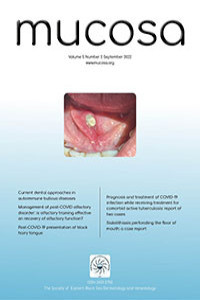Glikojen depo hastalığı Tip 3’ün dil tutulumu ile likenoid infiltrasyon birlikteliği
likenoid inflamasyon, glikojen depo hastalığı, Cori-Forbes hastalığı
Coexistence of the lingual involvement of glycogen storage disease type III with lichenoid infiltration
___
- Sun B, Brooks ED, Koeberl DD. Preclinical development of new therapy for glycogen storage diseases. Curr Gene Ther 2015;15:338-47.
- Kishnani PS, Austin SL, Arn P, et al. Glycogen storage disease type III diagnosis and management guidelines. Genet Med 2010;12:446-63.
- Thi Do T, Phoomak C, Champattanachai V, Silbsirivanit A, Chaiyarit P. New evidence of connections between increased O-GlcNAcylation and inflammasome in the oral mucosa of patients with oral lichen planus. Clin Exp Immunol 2018;192:129-37.
- Horvath JJ, Austin SL, Jones HN, et al. Bulbar muscle weakness and fatty lingual infiltration in glycogen storage disorder type IIIa. Mol Genet Metab 2012;107:496-500.
- Seyhan M, Ozcan H, Sahin I, Bayram N, Karincaoglu Y. High prevalence of glucose metabolism disturbance in patients with lichen planus. Diabetes Res Clin Pract 2007;77:198-202.
- Romero MA, Seoane J, Varela-Centelles P, Diz-Dios P, Garcia-Pola MJ. Prevalence of diabetes mellitus amongst oral lichen planus patients. Clinical and pathological characteristics. Med Oral 2002;7:121-9.
- Yamashita T, Ishibashi Y, Nagaoka I, et al. Studies of glycogen induced inflammation of mice. Dynamics of inflammatory responses and influence of antiinflammatory drugs and protease inhibitors. Inflammation 1982;6:87-101.
- Ceperuelo-Mallafre V, Ejarque M, Serena C, et al. Adipose tissue glycogen accumulation is associated with obesity-linked inflammation in humans. Mol Metab 2015;5:5-18.
- Zhang N, Zhang J, Tan YQ, et al. Activated Akt/mTOR-autophagy in local T cells of oral lichen planus. Int Immunopharmacol 2017;48:84-90.
- van der Meij EH, van der Waal I. Lack of clinicopathologic correlation in the diagnosis of oral lichen planus based on the presently available diagnostic criteria and suggestions for modifications. J Oral Pathol Med 2003;32:507-12.
- Ding J, Huang Y, Yang H, et al. Analysis of clinical features of 6 patients with infantile type glycogen storage disease type II. Zhonghua Er Ke Za Zhi 2015;53:436-41.
- Anitua E, Pinas L, Alkhraisat MH. Histopathological features of oral lichen planus and its response to corticosteroid therapy: A retrospective study. Medicine (Baltimore) 2019;98:e18321.
- ISSN: 2651-2750
- Yayın Aralığı: Yılda 3 Sayı
- Başlangıç: 2018
- Yayıncı: Doğu Karadeniz Deri ve Zührevi Hastalıklar Derneği
Disturbed postprandial lipid metabolism in patients with psoriasis: a preliminary report
Osman Çağlar ÇEVİK, Buket AKÇAN, Asım ÖREM, Sadık ÖZTÜRK, Sevgi BAHADIR, Savaş YAYLI
Psikiyatrik bakış açısı ile oral dizestezi
Işılay MANZAK SAKA, Demet SAĞLAM AYKUT, Filiz CİVİL ARSLAN
Non-Hodgkin lenfomanın farkı mukozal görünümleri: Olgu serisi
Ayşenur BAHADIR, Murat ÇAKIR, Elif SAĞ, Gökçe Pınar REİS, İlker EYÜPOĞLU, Erol ERDURAN, Osman BAHADIR
Glikojen depo hastalığı Tip 3’ün dil tutulumu ile likenoid infiltrasyon birlikteliği
Tugba Kevser UZUNCAKMAK, Zeynep ARSLAN, Ebru ZEMHERİ, Necmettin AKDENİZ, Ayse Serap KARADAG
Oral mukozada ve yüzde unilateral fibrolipomlar
Günseli ÖZTÜRK, Bengü GERÇEKER TÜRK, Arzu ŞAHİN, Banu YAMAN, Taner AKALIN, Can CEYLAN, Fazıl APAYDIN
